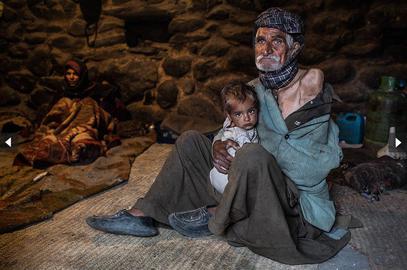This article was written by an Iranian citizen journalist based in Iran going by the alias Mohsen Sepehri to protect his identity.
Iranians have once again experienced major disruption to their internet access as news about the spread of coronavirus continues to emerge and people try to share information on social media.
On February 25, Iran’s Telecommunication Company sent a text message to its internet subscribers in Tehran, notifying them that it was upgrading the high-speed internet infrastructure and, as a result, users might experience interruptions in their service from Wednesday, February 26 until February 28. But then on Wednesday, customers received another notice, informing them that the upgrading of the infrastructure had been postponed. Nevertheless, internet service was still interrupted repeatedly, prompting suspicion.
In its first message on February 25, Iran’s Telecommunication Company notified its customers that they should expect interruptions in their internet service because the infrastructure was being upgraded. The next day customers were informed that this upgrading had been postponed. Nevertheless, there was disruption to the internet
Officials from the Ministry of Information and Communications Technology of Iran claimed the interruptions were the result of bandwidth saturation. In response to criticism on Twitter, Mohammad-Javad Azari Jahromi, minister of communications, tweeted: “Last night there was a 20-minute scheduled downtime [but] they have been informed that all further downtimes must be canceled.” When someone tweeted back asking Jahromi whether he really had knowledge of what was happening, he replied: “I really don’t know. The networks belonging to some companies in Tehran...were saturated but they will expand [the bandwidth] by tonight” [Persian links]. His responses appear to be evidence that the Ministry of Communications has not been properly informed about the infrastructure and what the companies providing internet service are planning.
In response to criticism on Twitter, Mohammad-Javad Azari Jahromi, minister of communications, tweeted: “Last night there was a 20-minute scheduled downtime [but] they have been informed that all further downtimes must be canceled”

When asked whether he knew what was happening, the minister replied: “I really don’t know.”
Nevertheless, Hossein Fallah Joushghani, head of the ministry’s Communications Regulatory Authority, denied there had been any interruptions in the internet service. He told reporters that in the last few days the level of consumption had jumped by up to 40 percent, saturating the bandwidth. As a result, he said, the speed had been reduced to mitigate the saturation and prevent the internet service from crashing. Joushghani also blamed internet users, saying that, because of coronavirus, people are staying home and using more video-on-demand services, which naturally saturate the bandwidth. Hamid Fattahi, CEO of the communications ministry’s Telecommunication Infrastructure Company, said that what internet users had been complaining about was not the interruption in the service or the infrastructure but the decline in the quality of the service. According to these officials, the problems should have been resolved by Saturday, February 29, but reports from internet users and various analyses of the internet speed in Iran reveal that the problems continue.
Quality of internet service in Iran on February 27 by the hour, categorized by service providers
Quality of internet service in Iran on February 27; data provided by major service providers
Experts have agreed that one of the major factors for the internet slowing down in Iran is the significant number of Iranians staying at home and using the internet for longer hours since the outbreak of coronavirus, whether for work or for entertainment. But since no accurate or reliable information about the internet infrastructure in Iran is available it is impossible to simply rely on claims by Iranian government officials.
Internet is Saturated so Let’s Use it More!
It is interesting that, despite the claim of saturation, the communications minister used social media to encourage people to go online more. In one tweet, Azari Jahromi wrote that he had talked to the managers of various streaming services in Iran, who told them that “from tomorrow until the end of the week, programs for children and some movies and TV series can be streamed for free.
“Considering that schools and universities might be closed until the end of the [Iranian calendar year on March 19], we have worked with the Ministries of Science and Education to provide special facilities for remote education online so that millions of students can keep up with their education without endangering their health,” he wrote.
Jahromi also encouraged people to conduct their work online. “Let’s meet by video conferencing!” Jahromi posted on Twitter. “This is what we have been doing at the communications ministry since Sunday. There are startups that are ready to provide...these services for government centers and private companies at a low price.”
He then promised in a subsequent tweet that “internet TV companies will continue to provide their free services” until the end of the Iranian new year. “The usage of these services will be charged half price. Also, the usage of all virtual education classes that are approved by the Ministry of Education and the Ministry of Science will be free.”
Experts, however, believe that other factors are likely to have contributed to the slowdown of the internet in Iran. One factor that must be seriously considered, they say, is that the Islamic Republic might be interrupting internet services, as it did during November protests, to control the news about the coronavirus outbreak. According to them, this has been accomplished by slowing down internet services to the outside world and giving the bandwidth to domestic networks.
The likelihood of this is high because the communications minister’s encouragement to use the internet has been focused on websites whose servers have recently been transferred to Iran. And recently, the newspaper Kayhan, a mouthpiece for the office of the Supreme Leader Ayatollah Khamenei, dedicated its lead headline to admonishing the communications minister, demanding that he must prevent news about coronavirus from getting out.
Related Coverage:
Authorities Shocked by Spread of Coronavirus in Gilan Province, 28 February 2020
Coronavirus has Made us Different People, 28 February 2020
Coronavirus Could Break Iranian Society, 27 February 2020
Friday Prayers Canceled Because of Coronavirus, 27 February 2020
Coronavirus Crisis in Iranian Prisons, 27 February 2020
Exclusive: Revolutionary Guards Force Health Officials to Keep Coronavirus Numbers Secret, 26 February 2020
Athletes Condemn Government’s Decision to Hold Sports Competitions, 26 February 2020
While the Government Was in Denial, She Contracted Coronavirus and Died, 26 February 2020
How Did Iran’s Religious Center Become the Country’s Coronavirus Epicenter?, 25 February 2020
Iranian Medical Professionals Confess They Are not Prepared to Handle Coronavirus, 24 February 2020
visit the accountability section
In this section of Iran Wire, you can contact the officials and launch your campaign for various problems



























comments